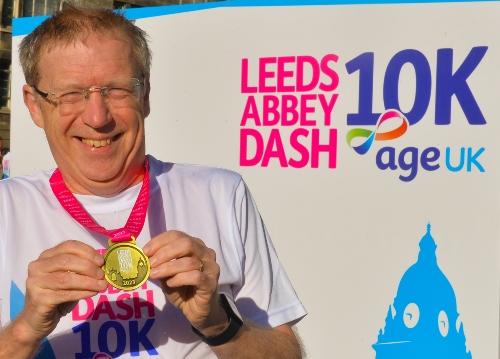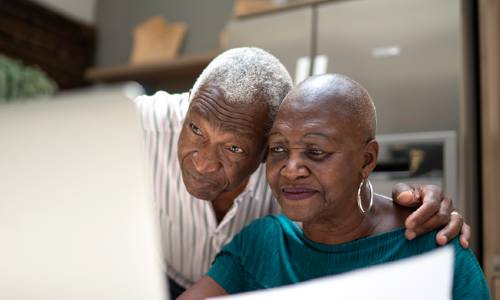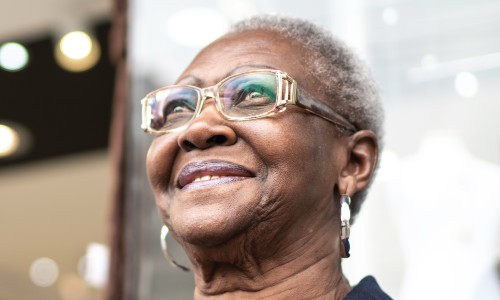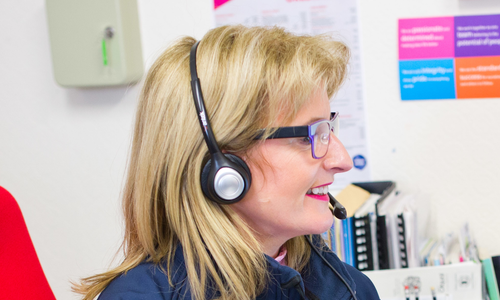Last Sunday, I took part in Age UK’s flagship event, the Leeds Abbey Dash 10k, to mark one year of having the honour and privilege of being the Chief Executive of this remarkable and vital network.
As I reached the three kilometre mark at the Leeds Abbey Dash 10k, the local MP Alex Sobel jogged alongside me and asked what we were thinking the solution to the social care problem was. We ran together for three more kilometres discussing the challenge and parted company, agreeing to reconvene when we were less breathless.
The work we do
One year in is a bit like running a long distance in that sense – it’s quite a way, but it’s only the start of a marathon journey to end ageism and ensure every older person is valued in our society.
I’ve now got a strong sense of the work we do, supporting around one million older people every year, our international work, our national influencing, and our local day-to-day support for so many people. Just this week I was in Coventry, meeting older people with Age UK Coventry & Warwickshire.
I met John, who used to work at Jaguar Land Rover in the factory. I found him in a woodwork session making some blocks and a pull along trolley for his great nephew. He told me that the woodwork is fun, but much more important is the company and the “nonsense chat” he has with his new friends.
Every day, our terrific local and national partners help thousands of people like John. Over the last year, many older people have continued to cope with the impact of COVID (even though most of the rest of the world seems to have forgotten it), the cost of living crisis, and now the challenges facing the NHS. “It isn’t easy growing old, you know,” one 85-year-old volunteer told me: “There’s so much to do, and everyone else is making it so hard.”
Long-term and short-term challenges
As we’ve been building our plans for the future, we’ve heard time and again from older people that they look to Age UK to give them a voice and for their experiences to be valued.
In the short-term, that means we need to ensure that the voices of older people are heard in the upcoming election campaign – not just on issues that affect them, but more widely on how we can bring society together to tackle some of the huge challenges we all face.
We must ensure that older people do not suffer because of the ongoing cost of living crisis by supporting people to claim the benefits they are entitled to, but the Government makes it incredibly difficult to do. And we must stand up for older people marginalised by society, such as the Windrush generation.
 All of these short-term challenges need to be addressed, but our job at Age UK is also to look beyond the political cycle – as a charity we can and we must do that.
All of these short-term challenges need to be addressed, but our job at Age UK is also to look beyond the political cycle – as a charity we can and we must do that.
I was therefore pleased to be a part of the Health Foundation’s ‘Health & Social Care in 2040’ session a couple of weeks ago, to help start that longer term conversation. There’s a lot to do: by 2040, there will be 2.5 million people with more long-term health conditions. Of that 2.5 million, 2.4 million will be aged over 65.
There could easily be parts of the country where there aren’t enough younger people to care for their older counterparts.
So, we must have an eye on the longer term – by eradicating ageism, and by encouraging more people to work in social care by making the pay and conditions better.
Our new strategy will aim to address the short, medium and long-term issues – locally, nationally, and internationally – where the past few weeks have shown how difficult and challenging life can be for older people in Israel and Gaza.
As I finished my 10k, I reflected upon the year that has flown by. There’s much to do, but there’s a sense of purpose and commitment from staff, our incredible volunteers, donors, partners and supporters that change is possible, and increasingly urgent, for many older people.
It is definitely a marathon and not a sprint, but I’m up for the challenge.





